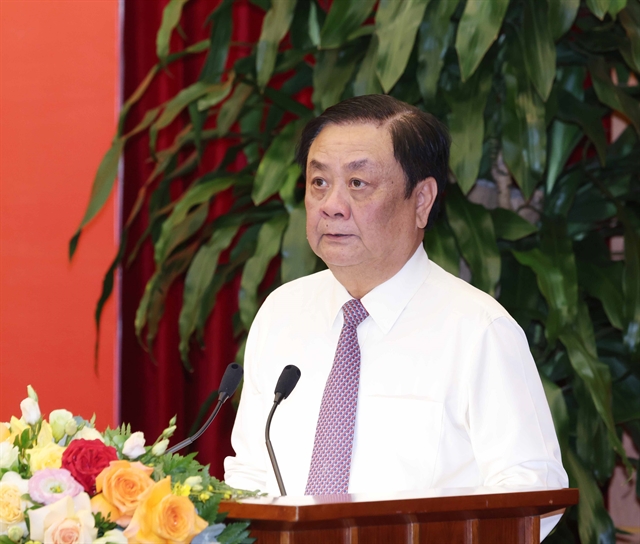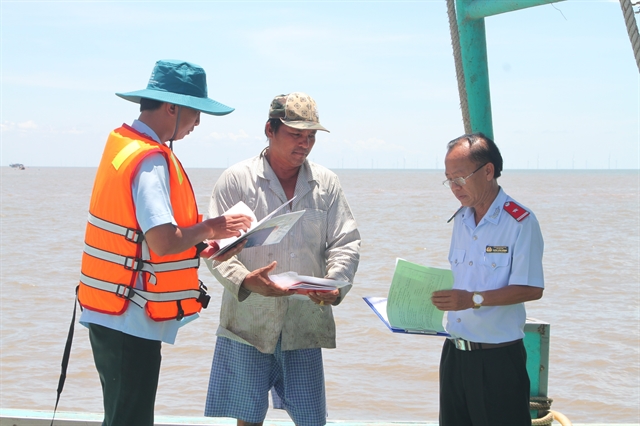.jfif) Opinion
Opinion

 |
| Minister of Agriculture and Rural Development, Lê Minh Hoan. — VNA/VNS Photo Phương Hoa |
Minister of Agriculture and Rural Development, Lê Minh Hoan, spoke to Việt Nam News Agency about strategies to overcome challenges in fishing vessel management, while also advocating for the establishment of a responsible and sustainable fishing industry to remove Việt Nam from the IUU 'yellow card' status.
Could you provide insights into the progress made in combating illegal, unreported and unregulated (IUU) fishing so far?
For nearly seven years, Việt Nam has been under the IUU 'yellow card' warning. However, efforts to address this status have seen considerable improvement. Recently, under the steadfast direction of Prime Minister Phạm Minh Chính, local authorities have shown increased proactivity in implementing and enhancing the recommendations provided by the European Commission (EC)'s inspection team.
Notably, the issuance of Directive No. 32-CT/TW by the Central Committee on April 10, 2024, underscores a commitment to bolster the Party's leadership in combating IUU fishing while simultaneously promoting sustainable development in the fisheries sector. This directive aims to mobilise the entire political system in guiding and directing efforts against IUU fishing, ensuring consistent support from both the Party and the State.
The primary challenge currently lies in enforcement at the local level. Despite evaluations by the EC inspection team highlighting improvements at the central level and in enacted institutions, there remains a crucial need for enforcement on the ground, particularly at the local level.
The Ministry of Agriculture and Rural Development, with other relevant ministries and sectors have collectively engaged at all levels to prepare for the upcoming EC inspection. This collaborative effort is seen as a critical opportunity to showcase Việt Nam's progress in line with the recommendations provided.
The Prime Minister has reiterated that effectively combating IUU fishing is a prerequisite that Việt Nam must overcome. The success in this endeavour will lead to improved market opportunities for Vietnamese seafood products in Europe.
All recommendations and prohibitions related to IUU fishing outlined by the EC are already enshrined in the Fisheries Law of 2017. However, the effectiveness of enforcement at the operational level remains a concern.
Conversations with fishermen reveal shared concerns regarding declining seafood reserves attributed to destructive fishing practices such as the use of small mesh nets and explosives. While livelihood considerations may sometimes hinder strict control, the long-term consequences of neglecting sustainable practices pose a significant threat to seafood resources. Recognising the vital role of the marine environment in nurturing these resources, the government's policy emphasises a shift towards reducing fishing, promoting aquaculture, and prioritising marine conservation efforts.
Could you shed light on the status of enforcement measures following your recent visits aimed at tackling these issues at the grassroots level?
One significant challenge revolves around human resources. It's evident that localities are grappling with restructuring and downsizing, which has resulted in limited manpower across the fisheries sector, including resources for fishing ports.
Despite these hurdles, many localities have taken proactive measures to address the situation. For example, they've established Fishery Inspection Sub-Departments at the local level and bolstered the capacity of fishing ports to enhance control mechanisms. However, given the scale of some fishing fleets and their seasonal movements, the existing manpower remains inadequate.
There's a pressing need for improved coordination among localities. Some regions have demonstrated commendable cooperation by promptly reporting violations committed by fishing vessels in their waters to the relevant authorities. So, regulations and directives have been enacted to ensure stringent penalties for any infractions.
In response to these challenges, I have directed the Fisheries Department and Fishery Inspection Sub-Departments to adopt a management approach based on maritime zones rather than fragmented local oversight. The ministry emphasises the importance of monitoring every vessel's movement from departure to arrival at any location. By doing so, regardless of where a violation occurs, authorities will have comprehensive information to enforce necessary actions, deterring fishermen from attempting to evade accountability.
 |
| Bạc Liêu provincial authorities inspect fishing vessels during patrols and monitoring activities. — VNA/VNS Photo Chanh Đa |
What are the pivotal issues that Việt Nam must address to remove the 'yellow card' during the forthcoming EC inspection?
There are three critical areas of concern based on the EC's recommendations. Firstly, there persists a problem of fishing vessels violating regulations in foreign waters. Secondly, certain vessels continue to deactivate their tracking devices, posing a challenge to monitoring efforts. Thirdly, owing to historical factors, Việt Nam harbours unregistered, unlicensed and unauthorised fishing vessels.
These persistent issues often lead fishermen to flout regulations, prompting ongoing efforts by local authorities to rectify the situation through the re-registration of these ships.
The matter of vessels disabling their tracking devices is of particular concern to the EC, which questions Việt Nam's inability to address this issue effectively. Despite ship owners attributing these incidents to equipment malfunctions or connectivity issues, the EC remains unsatisfied. It emphasises the importance of transparency, urging ship owners to report such incidents to authorities promptly.
Recent observations indicate a lack of rigour in managing the sector, both at the central and local levels, with enforcement measures proving inadequate in deterring violations.
While previously, one could argue about the adequacy of legal measures for punitive action, a notable case in Kiên Giang Province, where criminal proceedings were initiated, underscores that determination can lead to effective legal recourse, supported by central agencies.
This presents an opportunity for localities to not only contribute to lifting the IUU 'yellow card' but also to enhance the nation's reputation.
I believe that this commitment should extend beyond IUU fishing prevention to include broader restructuring initiatives aimed at fostering transparency, accountability, and sustainability within Việt Nam's fishing industry.
Addressing IUU fishing is just the initial step in this larger endeavour. The EC's observations highlight the need for sustained efforts, as some countries have regressed to past practices after the temporary lifting of their 'yellow card'. Therefore, the focus must extend beyond immediate concerns to address long-term sustainability issues. — VNS